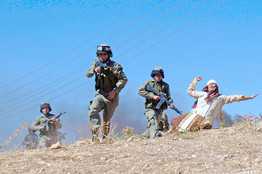By NICHOLAS BIRCH, CHARLES LEVINSON and MARC CHAMPION
A war of words ignited by a new Turkish TV series depicting Israeli military atrocities escalated Friday, shaking what is probably Israel’s strongest partnership in the Middle East.
The first episode of the series, “Separation,” aired Wednesday on the public channel TRT, showed what appeared to be an Israeli soldier gunning down an unarmed Palestinian girl in a cul de sac. Shortly afterward, another soldier shoots a newborn baby.
The images sparked outrage in Israel. Labor unions said they would boycott Turkey as a vacation destination, and Israel summoned Turkey’s ambassador Thursday to lodge a protest. Israeli Foreign Minister Avigdor Lieberman said in a statement Thursday the series “would not be appropriate in an enemy country and certainly not in a state which maintains diplomatic relations with Israel.”
Turkish Foreign Minister Ahmet Davutoglu responded Friday by criticizing Israel’s treatment of Palestinians. He said a recent decision to exclude Israel from planned North Atlantic Treaty Organization exercises in central Turkey was made in response to public outrage in Turkey over Israel’s treatment of Palestinian civilians in the Gaza Strip.
“While the tragedy in Gaza continues, nobody should expect us to put on military displays of this sort,” Mr. Davutoglu said.
As for the TV series, Mr. Davutoglu said: “Turkey is not a country based on censorship.”
Officials and analysts in both countries said the split reveals Ankara no longer needs or wants Israel the way it once did.
The two countries have long had strong diplomatic and trade relations, and Turkey has been a substantial buyer of Israeli military hardware. For years, Israeli pilots trained in Turkish airspace. As recently as August, Turkey took part in joint naval exercises with Israel.
But the ties were built in a period when Turkey felt hemmed in on all sides, analysts say. In the 1980s and 1990s, Turkey had poor relations with Iraq and shared with Israel a deep suspicion of Iran. It was also fighting a guerrilla war with Kurdish militants. In 1998, it came close to war with Syria. Turkey was also in conflict with Greece over Cyprus, while then communist Bulgaria and Armenia were historical and Cold War rivals. Ankara needed Israel’s military hardware and intelligence sharing.
“In the 1990s, Turkish foreign policy was guided by security issues, and that pushed Turkey closer to Israel,” says Kadri Gursel, a columnist for the centrist daily Milliyet.
But under Mr. Davutoglu and his boss, Prime Minister Recep Tayyip Erdogan, Turkey has worked hard to fix those problems and reintegrate into the region. This month, Turkey signed significant agreements with Armenia, Syria and Iraq.
“There is no need for this [partnership with Israel] anymore,” said Huseyin Bagci, professor of International Relations at the Middle East Technical University in Ankara.
Mr. Bagci predicts that Turkey increasingly will look to Italy, France and other suppliers to buy arms, rather than Israel.
The breakdown in relations also appears personal. Mr. Erdogan walked off the stage at the World Economic Forum in Davos in January after clashing with President Shimon Peres of Israel over the conflict in Gaza. In a recent interview with The Wall Street Journal, Mr. Erdogan was still simmering.
“If you look at Gaza, 1,500 people died, 5,000 people were wounded, infrastructure, the superstructures were all demolished. … What happened afterwards? There was nothing,” said Mr. Erdogan.
Israel and some Turkish analysts see an ideological component to the dispute, noting the Islamist roots of the ruling Justice and Development Party. “We’ve seen Turkey evolve and change since Erdogan’s Islamic party took power,” the senior Israeli official said.
Mr. Erdogan, in the interview, insisted his position wasn’t driven by identification with Muslim Palestinians, but by the need for honesty and fairness.
Turkish officials insist the relationship is far from dead. “Let’s make no mistake. We value a continuation of relations with Israel, but not at any cost,” said ruling-party official Suat Kiniklioglu.
Write to Charles Levinson at [email protected] and Marc Champion at [email protected]
Printed in The Wall Street Journal, page A9



Leave a Reply